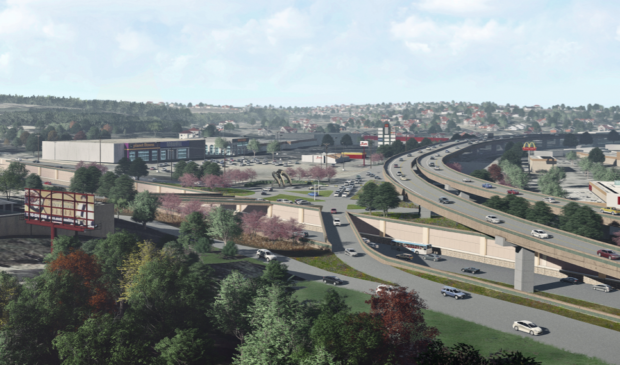Oak Hill Parkway project approved for construction
Wednesday, January 16, 2019 by
Ryan Thornton The Oak Hill Parkway project was added to the Capital Area Metropolitan Planning Organization’s 2019-2022 Transportation Improvement Program by unanimous vote at the Transportation Policy Board meeting Monday evening. The decision places the 12-lane elevated highway at the congested intersection of U.S. Highway 290 and State Highway 71 on track to begin construction in the next four years.
Also known as the Y at Oak Hill, the $426 million project has been under development and evaluation for decades. It has undergone several environmental reviews, including the National Environmental Protection Act process, and has been modified numerous times, partially in response to community input.
Originally planned as a toll project, the parkway was brought back to life in 2018 when the Texas Department of Transportation Commission gave it $224 million under the condition that it go forward without tolls. Several individuals speaking during the public hearing Monday evening criticized the board for not taking the removal of tolls as an opportunity to reconsider the project’s design.
Bobby Levinski, an environmental attorney who works with the local nonprofit Save Our Springs Alliance, said the project’s origins as a toll road are still responsible for the current design.
“Last year, when the announcement came that we were going to have money that could build this as a free-lane project, I actually got a little bit of hope that maybe we could finally roll up our sleeves and consider, realistically, the parkway concept,” Levinski said. “This is essentially an ’80s highway design and it doesn’t lead to good results.”
Since the initial design, the Oak Hill Parkway project has been through a long series of stakeholder meetings, workshops and open houses. While a number of changes have been made to accommodate the wishes of the Oak Hill community, including a lower elevation of the major interchange from 60 to 30 feet and efforts to preserve trees, the majority of those speaking at the public hearing still thought the project wasn’t ready to move forward yet.
The most common concerns cited by residents were the size and elevation of the 12-lane highway and the amount of excavated dirt necessary to bury portions of the project.
“This project was called a parkway because that’s what the community wanted,” said local resident Vicki Harper. “This project is a giant, three-story-tall, 12-lane-wide behemoth that requires additional depression and excavation enough to fill the Great Pyramid of Giza.”
In contrast to this plan is a design submitted by urban planner Daniel Alvarado called Livable Oak Hill, which features strong emphasis on promoting active transportation modes, access to transit and minimizing environmental impact. Alvarado said his design has not received a good faith review by the board despite having potential as a transportation solution and vision for the Oak Hill community.
Nonetheless, the Oak Hill Parkway received substantial support as a smart and necessary transportation solution. Among the supporters, state Rep. Vikki Goodwin and Hays County Commissioner Walt Smith both voiced their firm support.
Following the public hearing, Travis County Commissioner Gerald Daugherty made a motion of approval, quickly seconded by Williamson County Commissioner Cynthia Long.
Austin Mayor Steve Adler said, while the absence of tolls will make project maintenance more difficult in the future, he thinks the project will be done in an environmentally sensitive way and will set a precedent for construction practices in the future.
Adler said that the city of Austin will be contributing financially to the project and will also be seeking a memorandum of understanding with the state transportation department to ensure the most environmentally sensitive construction practices are used to minimize the impact to local aquifer recharge zones and the Oak Hill area.
Approval was passed unanimously with no abstentions. Travis County Commissioner Brigid Shea was absent from the meeting and did not have a vote by proxy.
Rendering courtesy of TxDOT.
The Austin Monitor’s work is made possible by donations from the community. Though our reporting covers donors from time to time, we are careful to keep business and editorial efforts separate while maintaining transparency. A complete list of donors is available here, and our code of ethics is explained here.
You're a community leader
And we’re honored you look to us for serious, in-depth news. You know a strong community needs local and dedicated watchdog reporting. We’re here for you and that won’t change. Now will you take the powerful next step and support our nonprofit news organization?






